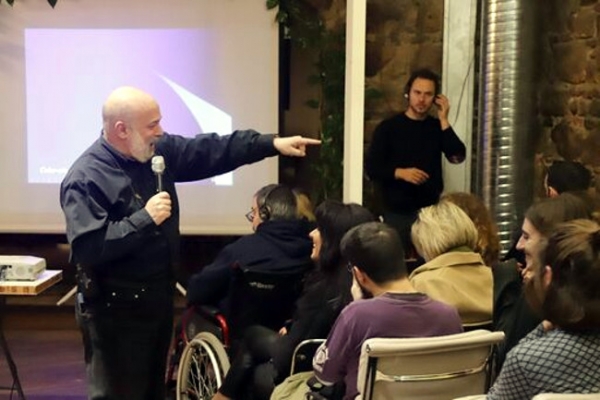Turning images into words and infuse them with new life within the mind of the people who couldn’t imagine pictures before.
How do people who are blind or have low vision access the rich visual aspects of the arts and media? Audio description provides the means so this population group can have full and equal participation in cultural life, as well as access to various cultural events. Audio description offers blind and partially sighted individuals the freedom to attend an event without the need to rely on others to tell them “what’s going on.” It involves the vivid and innovative use of language to translate visual images into words—the visual is made verbal.
Dr. Joel Snyder is one of the world’s first “audio describers” and the author of The Visual Made Verbal: A Comprehensive Training Manual and Guide to the History and Applications of Audio Description. Beginning in the early 1970s, he recorded "talking books" for the Library of Congress and read privately to the blind. He started describing theater events and media in 1980 with the world’s first ongoing audio description service in Washington, D.C.
Last December (2019), Dr. Synder traveled to Athens on a Fulbright Specialist grant for a series of educational seminars, workshops, and public programs in collaboration with the Athens-based accessibility advocates at Liminal Access, led by Christos Papamichael. The program also included open events and lectures for both professionals and the general public as well as meetings with agencies, organizations, and individuals in the field of audiovisual translation.
Throughout his three-week residency, Dr. Snyder conducted workshops on audio description and audio description training. He presented the Audio Description Project by the American Council of the Blind, met with the staff at the Lighthouse of the Blind and its Tactual Museum, and gave media interviews regarding audio description. He also presented, in collaboration with Stegi Onassis, a program attempting to open the field of Greek performing arts to a new audience. The program was addressed to performing arts professionals—including representatives of cultural institutions/theaters/festivals, directors, choreographers, and dramaturgists—aiming to demystify the audio description process and facilitate the equal participation of the visually impaired in cultural life.
The residency concluded with the seminar entitled Bridges for Cultural Accessibility and Inclusion, organized by Liminal Access. The seminar presented a summary of the history of audio description as well as the screening of a 17-minute Greek film with audio description in Greek, which was developed as a part of the intensive audio description training sessions during the Athens residency.
Fulbright Greece supports projects in all disciplines and provides short-term grants through the U.S. Specialists Program, where American experts collaborate with and offer their expertise to educational, cultural, scientific, civil, and research organizations in Greece.


